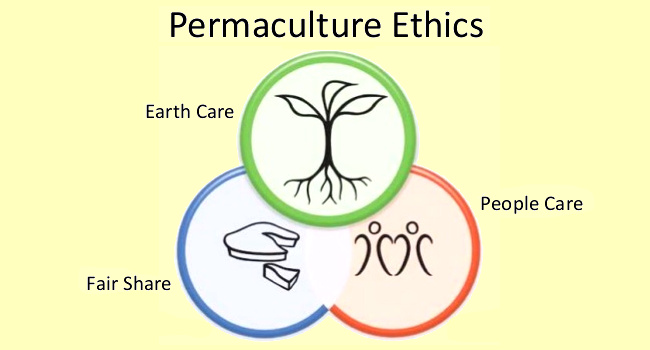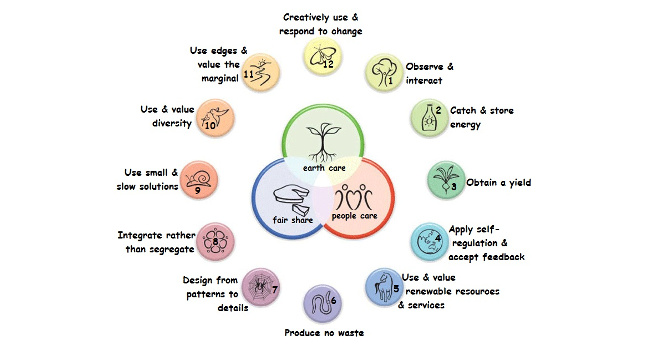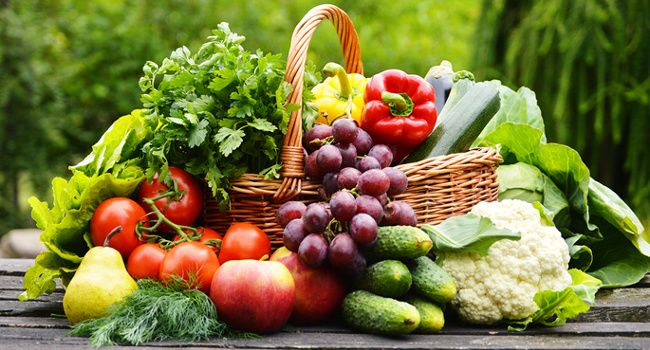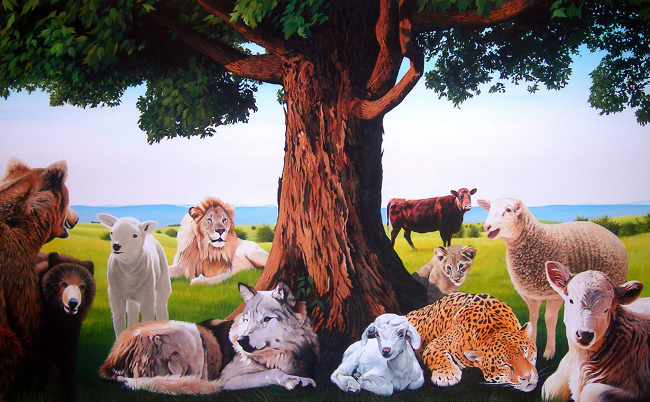
Reisha Marris of Ethical Permaculture looks at the principles of both veganism and permaculture and how they can complement each other in vegan permaculture.
Vegan permaculture is the new black! (Or is it green?) Actually it's more than just a fad, it's the evolutionary expansion of traditional permaculture. Vegan permaculture is the true path to healing our fellow Earthlings, the environment and humanity in a way that causes the least amount of harm as possible to everyone and everything. Vegan permaculture is a 'wholistic' solution to most of our world's problems.
Originally permaculture was described in the 1978 publication Permaculture One, by co-authors Bill Mollison and David Holmgren, as "an integrated, evolving system of perennial or self-perpetuating plant and animal species useful to man." More recently David has said that "a more current definition of permaculture, which reflects the expansion of focus implicit in Permaculture One, is consciously designed landscapes which mimic the patterns and relationships found in nature, while yielding an abundance of food, fibre and energy for provision of local needs. People, their buildings and the way in which they organise themselves are central to permaculture. Thus the permaculture vision or sustainable agriculture has evolved to one of permanent or sustainable culture."
Designing for sustainable human settlements is the primary focus of permaculture. It involves ecological landscapes for producing food, energy efficient buildings and appropriate technologies, building community, acting locally, and the efficiency and longevity of resources.

Basically permaculture is about design systems thinking, and has its core ethics and principles to always draw upon throughout the design process. When we look at the permaculture ethics of people care, earth care and fair share it is easy to believe that it encompasses all beings on the planet. Unfortunately this is not so. Not all animals are considered equal in permaculture. Most of the permaculture design systems still exploit certain species to consume and/or for use by either providing manure, conducting manual labour, or becoming fertiliser via farms, slaughterhouses and/or the fishing industry. It involves the enslavement and, more often than not, murder of sentient beings for human use.
Traditional permaculture still holds the viewpoint of carnism. Carnism is the invisible cultural belief system that conditions people to eat certain animals as a natural, normal and necessary thing to do. And speciesism, of which carnism is a sub-ideology, is a prejudice in favour of the human species and against those of other species dependant on either discrimination against them or exploitation of them for human benefit because of feelings of superiority. These viewpoints or beliefs then allow people to justify the exploitation of animals for any use whatsoever.
Of course, pertaining to the core ethics of traditional permaculture, exploiting animals for any purpose does not align with any type of 'care' in its truest definition for the rights of animals, the health of the environment or to peoples' mental, physical and spiritual needs.
Veganism is defined as "a philosophy and way of living which seeks to exclude, as far as is possible and practicable, all forms of, and cruelty to, animals for food, clothing or any other purpose; and by extension, promotes the development and use of animal-free alternatives for the benefit of humans, animals and the environment."
Of course, we cannot exist on Earth without causing some form of harm, whether it is from walking on tiny insects, or driving in our cars, or building any type of structure, however, we can do these things more mindfully and reduce our impact as much as possible.
Vegan permaculture embodies the ethics of permaculture at a deeper, more authentic level because the ethics of veganism becomes the driving force and foundation behind the permaculture ethics. This means that vegan permaculture rejects the use of animals or any animal derived product through any type of exploitation within its design systems or thinking. It is more than organic gardening too as it encompasses the whole system, integrating everything and segregating nothing.
A balanced ecosystem involves plants and wildlife. They work in harmony with each other as the natural world is meant to. Humans can learn so much from the natural world, especially in terms of our individual footprint on the planet. When we take into consideration our individual impact simply by being alive, we become more aware of the importance of our choices regarding everything we do. These choices include all our consumables, from food, clothing, accessories, furniture, etc., and how are they produced. For example, spending your hard earned money on purchasing food grown under modern agriculture practises, even organic, still involves the use and abuse of exploited animals such as their manure or blood and bone. Other choices also cover our mode of transport, the locations of where we live and work, our building designs, and the communities we live in. The list is ongoing.
Humans can live more in harmony with each other and the planet by becoming more aware and responsible for themselves and their choices. Each individual is powerful; we can make significant differences to our modern world through our everyday choices.
Human health is deteriorating around the globe. There is a huge amount of scientific evidence that our diets play a massive role in preventing, stopping and reversing some of our most debilitating illnesses and causes of death. When we're young we don't notice the long term impact of eating animal derived products but as we age we realise we're not as 'bullet-proof' as we once thought we were. Most people accept this as a part of life but then they resort to either heavily medicating, which has its own side effects, and/or invasive surgery or treatments. All of these practises are extremely dangerous and age us even more.

Eating a wholefoods, plant-based diet gives us the best chance at optimal health, especially if we accompany that with exercise and a balanced work-life ratio.
Another element to consider is our mental and spiritual health. If we think about the energetic and vibrational difference between a place of slaughter to a place of fun and happiness, we can 'feel' a definite distinction. Non-vegans take into their bodies and spirit all the negative energy and stress that farmed and hunted animals experience, especially leading up to and including their slaughter. Not only that, humans know on a deep level that we are all connected, and that murder for pleasure (which includes convenience, taste, tradition and habit) is wrong. The guilt, confusion and dislike we ultimately feel for ourselves by partaking in these atrocious acts towards our fellow Earthlings is subconscious, and ultimately has a negative impact on our state of mind and spiritual vibration. Consider too the vegan produce grown in modern agriculture practises, it also bears a burden.
Once people make the reconnection with their own compassion, usually lost or suppressed during childhood, they can then live in a more authentic way that gives them a greater sense of meaning to their lives. Vegans too can be unaware of where their food comes from and how it is produced, so to grow as much as we can ourselves or source it with full transparency provides the cleanest, healthiest and most peaceful food on the planet. We all can empower ourselves and be our most authentic selves by becoming more aware and more responsible.
Animals suffer immensely at the hands of humans. We have enslaved certain species of animals and bred them for us to use and exploit, along with the many wild species that we have also hunted/captured. However animals are not ours to use for food, fashion, experimentation, entertainment, labour or bred to be our companions. All animals are our fellow Earthlings and have the right to live their lives free from harm or exploitation by humans for humans or other animals. Animals deserve this freedom regardless of whether we consider them cute or intelligent, or whether we find them useful, or any other 'humanised' opinion about them that we may have.

We humans must change our thinking and attitudes so that we can change our actions to truly do as little harm as we possibly can.
There is a huge amount of science and research proving that animal agriculture is destructive to the environment. Whether it is from deforestation for grazing farmed animals or growing their food, to fresh water consumption, to waste and pollution, to species extinction and habitat destruction, there is no doubt that animal agriculture has an adverse effect upon planet Earth and all species.
While traditional permaculture teaches how to farm plants and animals on our own properties or locally within communities as a more sustainable, ethical and environmental way of living, vegan permaculture totally excludes the use of farmed animals. Instead it teaches how to design and utilise only plants and wildlife within any food production system, creating only natural ecosystems where wildlife are the only animal contributors. This allows humans to be in harmony with nature and wildlife, causing the least amount of negative environmental impact. Vegan permaculture can be incorporated in both urban and rural locations, in food production, human settlement design and planning, community living, and regenerating the natural world.
In summary, vegan permaculture can empower people to be more informed about all their decisions and ways of living; especially regarding food production. To become skilled at growing a percentage of our own clean, vibrant and nutrient dense food, and to become competent in designing our personal, business and community spaces is profound, uplifting and inspiring, and can happen in urban or rural locations. Vegan permaculture is all about designing for the needs of humans in the most peaceful, compassionate and mindful way that benefits humans, the animals and the environment.
Reisha runs two week intensive Vegan Permaculture Design Courses in Queensland. Please go to Ethical Permaculture to find our more.

Unsubscribe at any time. Your details are safe, refer to our privacy policy.
© Vegan Australia | Registered as a charity by the ACNC | ABN 21 169 219 854